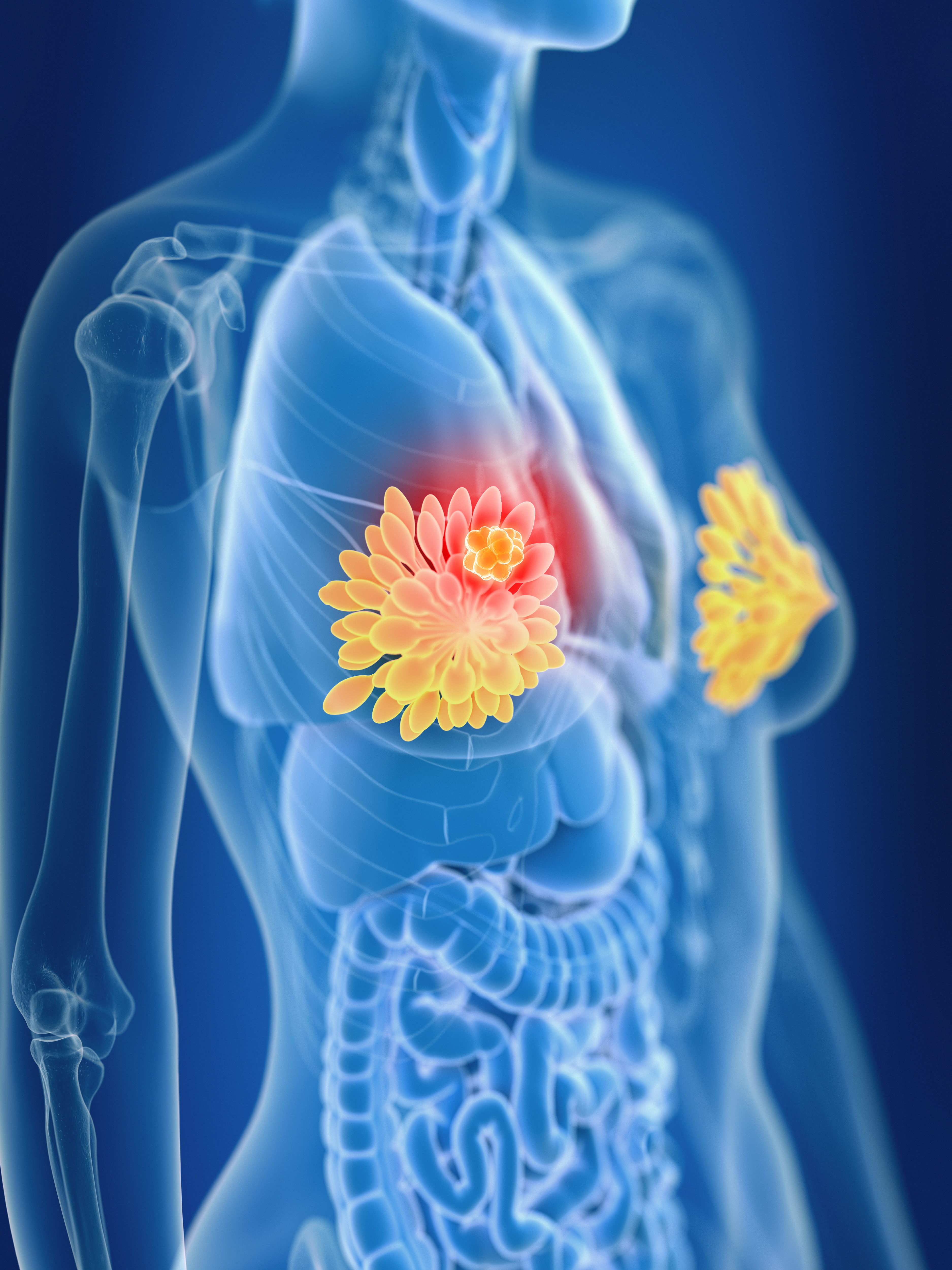PFS Benefit for Elacestrant Observed in ESR1-Mutated Subgroups in MBC
Improvement in progression-free-survival was demonstrated across all relevant subgroups in patients with ER-positive/HER2-negative, ESR1-mutated advanced or metastatic breast cancer.
3d rendered medically accurate illustration of a breast cancer: © SciePro - stock.adobe.com

Improvement in progression-free-survival (PFS) was demonstrated across all relevant subgroups in patients with ER-positive/HER2-negative, ESR1-mutated advanced or metastatic breast cancer, according to findings from a subgroup analysis of the phase 3 EMERALD trial (NCT03778931). The analysis revealed that exposure to CDK4/6 inhibitors plus estrogen therapy for at least 12 months improved PFS, suggesting that the estrogen receptor (ER) pathway could be the main driver of disease, regardless of the metastatic site or coexistence of PIK3CA or TP53 mutation.
“We evaluated 8 subsets, including patients with bone, liver, and lung metastases, HER2-low expression and HER2-zero expression, PIK3A mutation, and TP53 mutation,” coauthor Janice Lu, MD, PhD, Professor and Director of Breast Medical Oncology, Northwestern University Lurie Comprehensive Cancer Center, Chicago, IIllinois, said during the presentation of data at the 2023 San Antonio Breast Cancer Symposium.1
Patients (n = 478) were randomly assigned to receive elacestrant (n = 239) or standard of care (n = 239) and 228 patients were identified with an ESR1 mutation. In the ESR1 mutation group, 159 patients were treated with prior CDK4/6 inhibitors for 12 months, 71% had liver and or lung metastases, 39% had a PIK3CA mutation, 38% had a TP53 mutation, and 48% had HER2-low expression.
Among all patients with an ESR1 mutation, median PFS in the treatment arm was 8.61 months (95% CI, 4.14-10.84) vs 1.91 months in the control arm (HR, 0.410; 95% CI, 0.262-0.634).
In the current analysis, in patients with concomitant liver and/or lung metastases, the median PFS among patients in the elacestrant arm was 7.26 months compared with 1.87 months among patients treated with standard of care (HR, 0.354; 93% CI, 0.209-0.589). In patients with PIK3CA mutation, median PFS was 5.45 months vs 1.94 months, respectively (HR, 0.423; 95% CI, 0.176-0.941). In patients with TP53 mutation, median PFS was 8.61 months vs 1.87 months, respectively (HR, 0.300; 95% CI, 0.132-0.643). In patients with HER2-low expression, median PFS was 9.03 months vs 1.87 months, respectively (HR, 0.301; 95% CI, 0.142-0.604).
The EMERALD trial enrolled patients with ER-positive/HER2-negative metastatic breast cancer who were previously treated with 1 to 2 lines of endocrine therapy and an CDK4/6 inhibitor. Investigators allowed for previous treatment with fulvestrant (Faslodex). In the trial, patients either received 345 mg elacestrant or investigator’s choice of fulvestrant or an aromatase inhibitor.2
Randomization was stratified by ESR1 mutation status (detected vs not detected), prior treatment with fulvestrant (yes vs no), and visceral metastasis (yes vs no). The major efficacy outcome measure was progression-free survival (PFS), assessed by a blinded imaging review committee. A statistically significant difference in PFS was observed in the intention to treat (ITT) population and in the subgroup of patients with ESR1 mutations.2,3 Efficacy results from the EMERALD study led to the FDA approval of the agent.3
Regarding safety, most adverse events (AEs), including nausea, were grade 1 and 2, and no grade 4 treatment-related AEs were reported. Investigators reported that quality of life was maintained between treatment groups and no differences were observed between all patients and patients with ESR1 mutation.
No hematologic safety signal was observed, and no patients in either treatment arm exhibited sinus bradycardia. Further, no deaths were reported as treatment-related in either arm of the trial.
The most common all-grade AEs (10% or greater) reported in patients with ESR1 mutation in the treatment arm were musculoskeletal pain (50%), nausea (38.5%), and fatigue (25.6%). In the control arm, the most common all grade AEs (10% or greater) were musculoskeletal pain (37.3%), nausea (14.7%), and fatigue (22.7%).
“A clinically meaningful improvement in PFS favoring elacestrant compared with standard of care was consistent across all relevant subgroups with ESR1-mutation tumors and assumed endocrine-sensitivity,” concluded Lu.